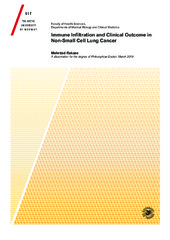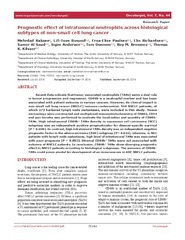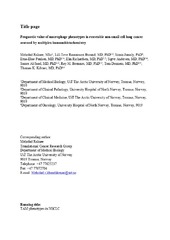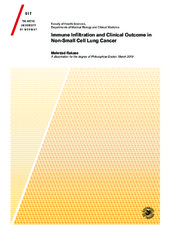| dc.contributor.advisor | Karsten Kilvær, Thomas | |
| dc.contributor.author | Rakaee, Mehrdad | |
| dc.date.accessioned | 2019-03-05T14:00:39Z | |
| dc.date.available | 2019-03-05T14:00:39Z | |
| dc.date.issued | 2019-03-12 | |
| dc.description.abstract | Lung cancer is the cancer responsible for the most deaths worldwide. Treatment is multimodal and based on information specific to the tumor (histology, stage, biology and genetics aberrations) and patient-related factors. During the last decade, the arrival of novel targeted therapies and immunotherapy, has led to a paradigm shift in the management of lung cancer. In this regard, assessment of tumor immunology is of great interest to researchers and clinicians.
The immune system undoubtedly plays an important role in the progression and development of cancer. Although it is just a snap-shot picture, it is established that the local immune status, at the time of resection, can provide important prognostic information and influence the clinical management and survival of cancer patients. Currently, the most prominent examples, where immune cell assessment are clinically relevant, are colorectal and breast cancer.
The immune infiltrate comprises adaptive and innate immune cell subsets in which lymphocytes, macrophages and neutrophils are the major populations orchestrating tumor immunity. Advancing the understanding of immune infiltration has significant potential for the development of clinical prognostic and predictive immune markers for patients with NSCLC. The ultimate goal in studying the in situ immunity of NSCLC is to apply this information for optimization of immunomodulation and immunotherapy.
The present study was designed to study tumor-infiltrating lymphocytes, macrophages and neutrophils, which seems to represent a potential powerful prognostic instrument for NSCLC. In addition, this thesis emphasizes the importance of the choice of methodology for reliable identification of relevant immune biomarkers. | en_US |
| dc.description.doctoraltype | ph.d. | en_US |
| dc.description.popularabstract | In Norway, lung cancer is the second and third most common cancer in men and women, respectively. During cancer development, interaction between the tumor and its surrounding environment shapes the destiny of the tumor cells. Immune cells will in many cases inhibit tumor growth. Neutrophils, lymphocytes and macrophages are the most predominant immune cells in tumor tissues. This thesis aims to examine associations between these cells and clinical outcome of 553 non-small cell lung cancer patients. Rakaee and coworkers found that patients with high level of neutrophils (in squamous cell carcinoma histology), lymphocytes and macrophages (any phenotype including M1 & M2) exhibit improved cause-specific and overall mortality and have lower risk of disease progression. These results will be validated in an ongoing clinical trial aiming at implementation of the most promising immune markers in routine clinical practice. Ultimately, helping physicians predict prognosis and improve treatment decisions. | en_US |
| dc.identifier.uri | https://hdl.handle.net/10037/14854 | |
| dc.language.iso | eng | en_US |
| dc.publisher | UiT The Arctic University of Norway | en_US |
| dc.publisher | UiT Norges arktiske universitet | en_US |
| dc.relation.haspart | <p>Paper I: Rakaee, M., Busund, L-T., Paulsen, E-E., Richardsen, E., Al-Saad, S., Andersen, S., … Kilvaer, T.K. (2016). Prognostic effect of intratumoral neutrophils across histological subtypes of non-small cell lung cancer. <i>Oncotarget, 7</i>(44), 72184-72196. Also available at <a href=https://hdl.handle.net/10037/10665>https://hdl.handle.net/10037/10665. </a><p>
<p>Paper II: Rakaee, M, Kilvaer, T.K., Dalen, S.M., Richardsen, E., Paulsen, E-E., Hald, S.M., … Busund, L.-T. (2018). Evaluation of tumor-infiltrating lymphocytes using routine H&E slides predicts patient survival in resected non-small cell lung cancer. <i>Human Pathology, 79</i>, 188-198. The article is available in the thesis introduction. Published version also available at <a href=https://doi.org/10.1016/j.humpath.2018.05.017>https://doi.org/10.1016/j.humpath.2018.05.017. </a><p>
<p>Paper III: Rakaee, M., Busund, L-T., Jamaly, S., Richardsen, E., Paulsen, E-E., Al-Saad, S. … Kilvaer, T.K. Prognostic value of macrophage phenotypes in non-small cell lung cancer assessed by multiplex immunohistochemistry. (Submitted manuscript). Published version in <i>Neoplasia, 21</i>(3), 282-293, is available at <a href=https://doi.org/10.1016/j.neo.2019.01.005>https://doi.org/10.1016/j.neo.2019.01.005. </a><p> | en_US |
| dc.rights.accessRights | openAccess | en_US |
| dc.rights.holder | Copyright 2019 The Author(s) | |
| dc.rights.uri | https://creativecommons.org/licenses/by-nc-sa/3.0 | en_US |
| dc.rights | Attribution-NonCommercial-ShareAlike 3.0 Unported (CC BY-NC-SA 3.0) | en_US |
| dc.subject | VDP::Medical disciplines: 700::Basic medical, dental and veterinary science disciplines: 710::Medical molecular biology: 711 | en_US |
| dc.subject | VDP::Medisinske Fag: 700::Basale medisinske, odontologiske og veterinærmedisinske fag: 710::Medisinsk molekylærbiologi: 711 | en_US |
| dc.title | Immune Infiltration and Clinical Outcome in Non-Small Cell Lung Cancer | en_US |
| dc.type | Doctoral thesis | en_US |
| dc.type | Doktorgradsavhandling | en_US |


 English
English norsk
norsk



